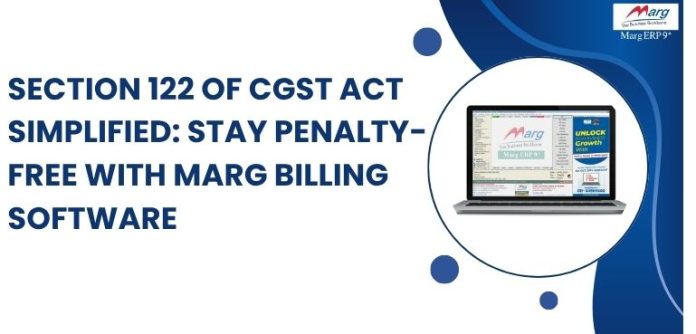Section 122 of the Central Goods and Services Tax (CGST) Act deals with penalties and offences under GST law. It is aimed at curbing non-compliance such as false invoicing, mis‐claiming input tax credit (ITC), suppression of turnover, failing to remit tax, and other wrongful practices.
The section outlines various categories of offences, the nature of wrongdoing (fraudulent and wilful misstatement or otherwise), and prescribes monetary penalties accordingly.
It is important for businesses using any accounting software, invoicing software or billing software to be aware of these provisions, since many offences stem from documentation errors, fake invoices, or incorrect claims via a GST billing software.
We suggest exploring Marg GST Billing Software for an error-free billing and inventory management software.
What are Major Offences Listed under Section 122 of CGST Act?
Here are some of the major offences listed under Section 122:
- Supplying goods or services without issuing an invoice, or issuing false / incorrect invoices.
- Issuing invoices for no actual supply (i.e. raising invoices without delivering goods/services).
- Collecting tax from customers but failing to remit that tax to the government within three months.
- Failing to deduct or remit tax under Section 51 (TDS under GST) and Section 52 (Tax Collection at Source under GST).
- Claiming input tax credit without actually receiving the goods / service.
- Fraudulently obtaining refunds.
- Suppressing turnover, failing to furnish required records or registration details, or obstructing officers in discharge of their duties.
The Section 122 of CGST Act also covers aiding or abetting such offences or knowingly dealing with goods or services liable to confiscation.
What are the Penalties Prescribed under Section 122?
Section 122 of the CGST Act comprises various sub-sections that deals with penalties for specific offence. Here are key sub-sections for your reference.
Section 122(1)
For offences like issuing false invoice, tax collection but non-remittance, misuse/distribution of ITC etc., the penalty is the higher of Rs.10,000 or an amount equivalent to the tax involved (for instance tax evaded or the input tax credit wrongly claimed).
Section 122(1A)
Retaining benefit of such wrongful transactions (like false invoices or wrongful ITC) may attract penalty equal to the amount of benefit (i.e. equivalent to tax evasion / ITC wrongly passed on).
Section 122(1B)
Specific to e-commerce operators under section 52, e.g. allowing unregistered persons to trade via their platform in violation of rules, or incorrect documentation, penalty is Rs. 10,000 or equivalent to the tax liability (whichever is higher).
Section 122(2)
For supply without payment (or short payment), or erroneous refund or availing ITC wrongly (other than fraud / wilful misstatement), penalty is Rs. 10,000 or 10 % of the tax due, whichever is higher.
Section 122(3)
For aiding / abetting offences, or for refusing to appear before an officer, or dealing with confiscable goods knowingly, penalty up to Rs. 25,000.
These penalties underscore why maintaining proper records, accurate invoices, and timely compliances is critical. That’s why businesses need an efficient and all-inclusive GST Billing Software to stay compliant and growth ready.
Why a Good GST Billing Software Matters.
A robust GST Billing Software like Marg ERP addresses and help businesses avoid many of the offences covered under Section 122. It strengthens businesses with;
- Automatic validation of tax rates, HSN/SAC codes, and GSTIN details while generating invoices can prevent issuing false or incorrect invoices.
- Integrated modules for input tax credit tracking reduce risk of claiming ITC without receipt of goods / services.
- Audit trail and logs help respond to compliance verification in case officers demand records.
- Reminders or checks to ensure that collected tax is remitted on time, or TDS / TCS-GST obligations (Section 51 / 52) are fulfilled.
- Generating reports that reconcile invoicing data with returns (e.g. GSTR-1/GSTR-3B) to spot discrepancies early.
Using reliable accounting software that ensures consistency across financial records, reducing the scope of misstatements, and overall impact on turnover. When looking for the best GST billing software in India, features like audit logs, automated reconciliation, compliance alerts, and up-to-date tax‐rule engine become especially important.
How Businesses Can Stay Compliant.
Here are practical steps SMEs should follow to stay compliant for Section 122:
- Use verified GST Billing Software that supports creating compliant invoices (with e-invoice where applicable), tracks ITC, and integrates with return filing.
- Keep documentation ready including vendors’ invoices, supply records, purchase receipts, and ensure invoicing matches physical / service delivery.
- Track remittance obligations to ensure tax collected is remitted within due timelines. TDS and TCS obligations are handled via your accounting software.
- Reconcile invoices with returns monthly and quarterly to detect discrepancies early.
- Train staff on GST compliance and periodically audit your invoicing / accounting processes for red flags.
Conclusion
These steps, teamed with good invoicing software like Marg ERP, reduce risk of facing large penalties under Section 122 of CGST Act.
Marg Billing Software is India’s no.1 Inventory and Accounting Software. If properly configured, Marg invoicing software can help you maintain compliance with Section 122 by ensuring your invoices, tax remittance, and ITC claims are consistent, documented, and auditable.
Frequently Asked Questions
What triggers a penalty under Section 122?
A penalty is triggered under Section 122 by offences such as issuing false or incorrect invoices, failing to remit collected tax, claiming ITC without receiving goods/services, or suppressing turnover.
Is the penalty always fixed Rs.10,000?
No, for many offences the law prescribes “higher of Rs.10,000 or amount equivalent to tax evaded or ITC wrongly claimed. Some penalties (e.g. under Section 122(2)) are the higher of Rs.10,000 or 10 % of tax due.
Can an e-commerce operator be penalised under Section 122?
Yes, under Section 122(1B), an e-commerce operator that allows unregistered persons to trade via its platform or fails to maintain documentation may attract penalty.
How can invoicing / accounting software help reduce risk?
Proper software helps generate accurate invoices, maintain audit trails, check compliance rules automatically, reconcile with returns, and send alerts for missing documentation or delayed remittance.
What should I look for in the best GST billing software in India?
You should look for features like built-in compliance checks, e-invoicing support, ITC tracking, reconciliation tools, audit logs, integration with accounting software, and reliable vendor support.




















